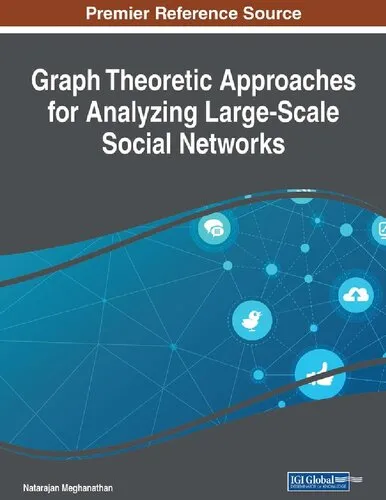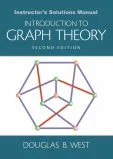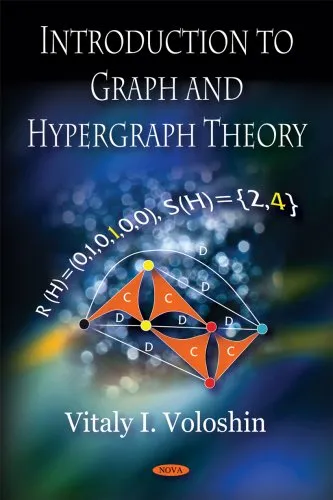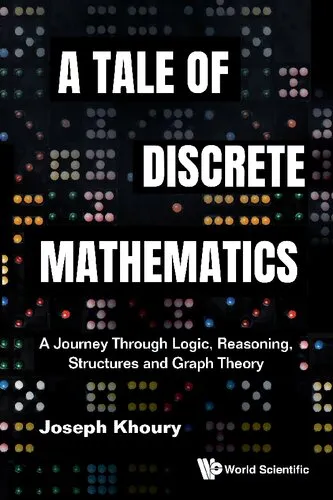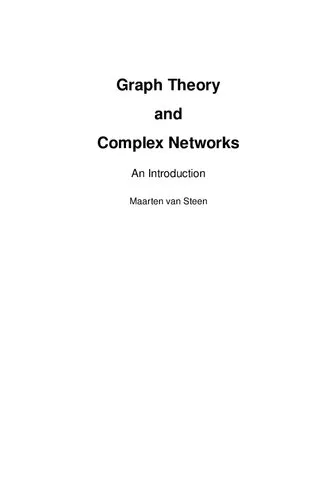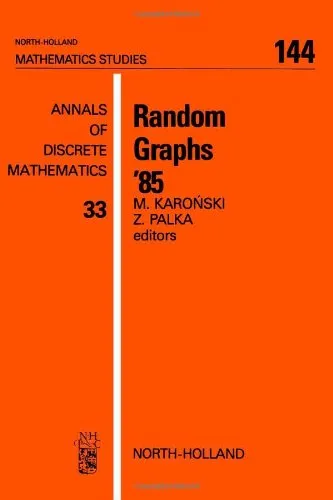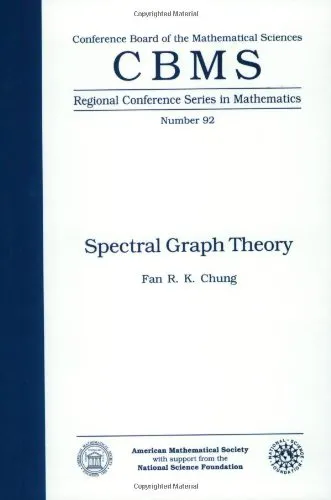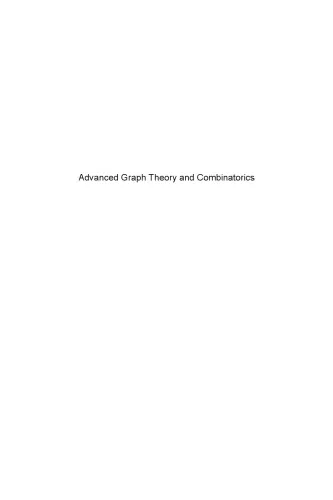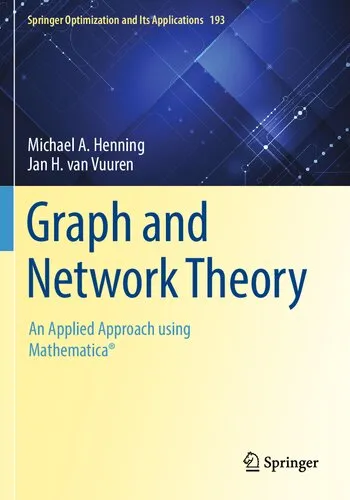Graph Theoretic Approaches for Analyzing Large-Scale Social Networks
4.0
بر اساس نظر کاربران

شما میتونید سوالاتتون در باره کتاب رو از هوش مصنوعیش بعد از ورود بپرسید
هر دانلود یا پرسش از هوش مصنوعی 2 امتیاز لازم دارد، برای بدست آوردن امتیاز رایگان، به صفحه ی راهنمای امتیازات سر بزنید و یک سری کار ارزشمند انجام بدینکتاب های مرتبط:
مقدمهای بر «Graph Theoretic Approaches for Analyzing Large-Scale Social Networks»
کتاب «Graph Theoretic Approaches for Analyzing Large-Scale Social Networks» یکی از آثار برجسته در زمینه بررسی شبکههای اجتماعی وسیع با استفاده از Graph Theory است. این کتاب توسط "Natarajan Meghanathan" تدوین شده و به معرفی ابزارها، الگوریتمها و تکنیکهای گرافمحور برای تحلیل شبکههای اجتماعی به صورت کاربردی و تئوری میپردازد. این اثر بهویژه برای پژوهشگران، دانشجویان، و علاقهمندان به Data Science و Network Analysis، به منبع قابل اعتمادی تبدیل شده است که بین مباحث پیچیده تئوری و کاربردهای عملی، پلی قدرتمند ایجاد میکند.
در این کتاب، خواننده با مفاهیم عمیقی از شبکههای اجتماعی آشنا میشود که به چالشهای بزرگمقیاسی همچون تحلیل رفتار کاربران و ارتباطات گرهها در محیطهای پیچیده پاسخ میدهد. از دیگر ویژگیهای شاخص این کتاب، همگامی آن با پیشرفتهای مدرن در زمینه Graph Theory و ارائه مثالهای واقعی از شبکههای اجتماعی مانند Facebook، Twitter، و LinkedIn است.
خلاصهای کامل از کتاب
در این کتاب، ابتدا مفاهیم بنیادی Graph Theory شامل گرافهای جهتدار، بدونجهت، وزندار و الگوریتمهای مرتبط معرفی میشوند. سپس، تکنیکهایی برای مدلسازی شبکههای اجتماعی بزرگمقیاس ارائه میگردد. گرافها بهعنوان ساختارهای اصلی تحلیل این شبکهها مورد استفاده قرار میگیرند. خواننده میآموزد که چگونه با بهرهگیری از شاخصهای گراف مانند Centrality ،Clustering Coefficient و Community Detection ساختارها و رفتارهای اجتماعی را تحلیل کند.
سرفصلهای کتاب به موارد زیر تقسیم میشوند:
- بررسی مفاهیم پایهای Graph Theory و شبکههای اجتماعی
- معرفی مدلهای تصادفی و الگوریتمهای مسیریابی در Graphs
- تحلیل Centrality و نقش آن در شبکههای اجتماعی
- کاربرد Data Mining در تحلیل گرافهای بزرگ
- تشخیص جوامع (Community Detection) و خوشهبندی در شبکهها
در پایان، خوانندگان با تکنیکهایی آشنا میشوند که به بهینهسازی تحلیلها در Graphs و مدیریت دادههای بزرگ (Big Data) کمک میکنند. این کتاب، یک منبع ارزشمند برای تجزیه و تحلیلهای مبتنی بر Graph Theory است.
مباحث کلیدی و نکات ارزشمند
در این کتاب، چندین نکته کلیدی ارائه شده است که میتواند مسیر تحلیل شبکههای اجتماعی را برای خواننده روشنتر کند. ازجمله:
- نحوه استفاده از الگوریتمهای مشهور مانند Dijkstra و PageRank در تحلیل شبکههای اجتماعی
- روشهای طراحی و آزمایش مدلهای کاربردی برای Social Networks
- تشخیص ساختارها و جوامع از طریق Partitioning Algorithms
- اهمیت استفاده از تکنیکهای Machine Learning در فهم بهتر شبکهها
این موارد به خواننده کمک میکند تا ابزارها و مدلهای بهتری برای درک و تفسیر رفتار شبکههای اجتماعی توسعه دهد.
نقلقولهای معروف از کتاب
«Understanding the dynamics of large-scale social networks requires both theoretical rigor and practical insights into Graph Theory.»
«Graphs are not just mathematical structures; they are powerful tools to decode the complexities of human connections.»
چرا این کتاب اهمیت دارد؟
با گسترش سریع شبکههای اجتماعی و حجم عظیم دادههای تولیدشده در این محیطها، تحلیل این دادهها به یکی از مهمترین چالشهای محققان و دانشمندان علم داده تبدیل شده است. کتاب «Graph Theoretic Approaches for Analyzing Large-Scale Social Networks» به این چالش پاسخ داده و روشهای سیستماتیکی را برای تجزیه و تحلیل این شبکهها پیشنهاد میدهد. این کتاب نهتنها ابزارهای تحلیلی جدیدی معرفی میکند، بلکه نشان میدهد چگونه میتوان از Graph Theory برای فهم عمیقتر دادهها و روابط انسانی استفاده کرد.
این اثر از این حیث اهمیت دارد که مفاهیم پیچیده ریاضی را به زبانی ساده و کاربردی تبدیل کرده و به پژوهشگران کمک میکند تا بینش جدیدی در زمینه Social Networks و Graph Theory به دست آورند. اگرچه موضوع این کتاب تخصصی است، اما ارائه مثالهای کاربردی و مطالعات موردی، آن را برای دسته وسیعی از مخاطبان قابل استفاده کرده است.
Introduction
Welcome to Graph Theoretic Approaches for Analyzing Large-Scale Social Networks, a detailed exploration of the profound ways in which graph theory can be applied to uncover insights hidden within the vast and ever-expanding world of social networks. The digital era has rapidly transformed how individuals interact, communicate, and consume information. Social networks, as a result, have become crucial ecosystems for studying human behavior, relationships, and influence. However, the growing size and complexity of these networks demand advanced analytical tools and methods. This book is designed to bridge the gap between social network analysis and graph theory, equipping readers with the knowledge and techniques required to analyze large-scale social networks effectively.
The book combines theoretical foundations with practical applications, offering a balanced blend of accessible content for those new to the field and in-depth explorations for seasoned researchers. Readers will embark on a journey through graph-theoretic methodologies, algorithms, and case studies that highlight real-world applications. Whether you're an academic, data scientist, or a professional intrigued by this field, this book will serve as an indispensable resource for mastering the unique challenges of analyzing large-scale social networks.
Detailed Summary of the Book
This book is structured to facilitate a comprehensive understanding of how graph theory can be applied to analyze the structure, dynamics, and patterns of social networks. The chapters move systematically from fundamental concepts to advanced applications, ensuring readers of all levels can engage with the content meaningfully.
- In the initial chapters, the book introduces the core principles of graph theory, covering fundamental concepts such as nodes, edges, degree distributions, connectivity, and types of graphs. The focus is on establishing a strong theoretical foundation for understanding complex networks.
- Subsequent sections delve into specific types of network analyses, such as centrality measures, community detection algorithms, and link prediction strategies. These topics help elucidate how to measure influence, detect hidden patterns, and forecast relationships within social networks.
- The book also dedicates chapters to dynamic and temporal networks, acknowledging the dynamic nature of real-world social interactions. Readers will learn how to study evolving relationships and model networks as they change over time.
- Real-world applications and case studies provide tangible examples of the theories and techniques discussed. From understanding viral content spread to analyzing friendship networks and political campaigns, these practical insights give context to the abstract concepts.
- Finally, the book explores the computational challenges of analyzing large-scale datasets, offering algorithmic solutions and frameworks optimized for handling the scale and complexity of modern social networks.
Throughout the book, accessible explanations are accompanied by diagrams, pseudocode, and practical examples to ensure readers can put theory into practice with ease.
Key Takeaways
By the end of the book, readers can expect to have gained the following critical insights:
- A deeper understanding of graph theory and its application in social network analysis.
- The ability to design, implement, and analyze algorithms for studying large-scale networks.
- Expertise in identifying patterns, communities, and influential nodes within a network.
- Insights into real-world case studies that illustrate key theories and methodologies.
- The skills necessary to overcome computational challenges associated with analyzing large-scale datasets.
- An appreciation for the interdisciplinary nature of social network analysis, combining graph theory, sociology, computer science, and more.
Famous Quotes from the Book
"The true power of graph theory lies in its ability to simplify the seemingly intractable complexity of networks into something we can observe, analyze, and ultimately understand."
"Social networks are not merely collections of connections; they are living, ever-evolving ecosystems, each with its own story waiting to be uncovered through the lens of graph theory."
"In a world of boundless connectedness, the ability to make sense of relationships and influence is not optional—it is essential."
Why This Book Matters
The importance of understanding social networks cannot be overstated in today’s hyperconnected world. They shape countless aspects of our lives, from personal relationships to global information flow and decision-making processes. Despite their importance, analyzing large-scale social networks has remained a formidable challenge for many researchers and practitioners. This book fills a crucial gap by presenting a structured, graph-theoretic approach to tackling these issues.
The book not only empowers readers to utilize advanced analytical techniques but also fosters a deeper appreciation for the role of networks in shaping society. By combining theoretical rigor with practicality, this work contributes meaningfully to education and research, helping bridge disciplines and fostering collaboration between academia and industry.
Through this book, readers will be better equipped to solve pressing real-world problems, from understanding the spread of misinformation to optimizing network-based infrastructures. In short, it is a vital resource for anyone looking to harness the transformative power of graph theory in analyzing and understanding social networks.
دانلود رایگان مستقیم
شما میتونید سوالاتتون در باره کتاب رو از هوش مصنوعیش بعد از ورود بپرسید
دسترسی به کتابها از طریق پلتفرمهای قانونی و کتابخانههای عمومی نه تنها از حقوق نویسندگان و ناشران حمایت میکند، بلکه به پایداری فرهنگ کتابخوانی نیز کمک میرساند. پیش از دانلود، لحظهای به بررسی این گزینهها فکر کنید.
این کتاب رو در پلتفرم های دیگه ببینید
WorldCat به شما کمک میکنه تا کتاب ها رو در کتابخانه های سراسر دنیا پیدا کنید
امتیازها، نظرات تخصصی و صحبت ها درباره کتاب را در Goodreads ببینید
کتابهای کمیاب یا دست دوم را در AbeBooks پیدا کنید و بخرید
1499
بازدید4.0
امتیاز0
نظر98%
رضایتنظرات:
4.0
بر اساس 0 نظر کاربران
Questions & Answers
Ask questions about this book or help others by answering
No questions yet. Be the first to ask!
